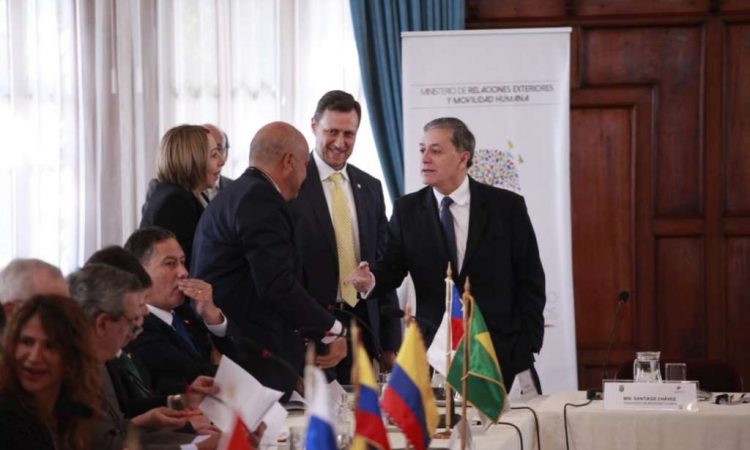
Ecuador convened for this Monday, September 3, 2018 a representative of 12 countries in Latin America to discuss possible regional solutions in regard to the massive migration of Venezuelans, the largest humanitarian crisis facing the continent with more than two million citizens .
The regional meeting, which will take place in Quito until this Tuesday, September 4 and will be of a “technical” nature, will bring together an authority from Argentina, Brazil, Costa Rica, Colombia, Chile, Ecuador, Mexico, Panama, Paraguay, Peru, Bolivia and Uruguay, according to the Foreign Ministry.
“We have a serious problem in the region, countries like Ecuador that have the direct impact and have a problem to address this problem with limited resources, have to articulate with other countries and propose solutions,” the Ecuadorian Deputy Minister of Mobility said about the meeting. Humana, Santiago Chávez.
In a statement, the high official said that his country has taken an initiative that is a regional issue, and “is not only Ecuador or Colombia or Peru,” the countries that have had the past tense have called a series of encounters, although more limited in scope, to address the same problem.
Ecuador, for the moment in which more than one million migrants were ahead, of which 20% stayed in the country, seeks to involve others in practical solutions, and find economic assistance to face the costs of the phenomenon, as they have said his authorities
The UNHCR and the International Organization for Migration (IOM), as well as the Inter-American Development Bank (IDB), the World Bank (WB) and the Andean Development Corporation (CAF), have also been invited to attend the meeting. observers.
Chávez explained that the expectation of the regional meeting is for each country to assume its “co-responsibility in the issue” and that “the Venezuelan government be asked to implement policies so that the migration of that country is adequately addressed in the host nations ”
For the moment, the participation in the meeting of any representative of the Venezuelan Government has not been confirmed, a country from which Ecuador has distanced itself in the last year and towards which it has hardened its criticism, with the names of “inhumane” and “irresponsible. ”
Despite this, Ecuador continues to appeal to a democratic solution among all Venezuelans.
With an exclusively technical approach, Ecuador will propose to the other participants proposals of economic and social nature for “the insertion of migrants in the countries (recipients) and the search for solutions so that they have a decent life”.
“Beyond the palliative international aid for specific moments of emergency, we have to see further; to undertake projects, receive investments for productive activities, for construction of schools and hospitals, “said Chavez, who stressed that the most political approach will be for the next meeting of the Organization of American States (OAS).
An approach supported by Sister Elsie Monge, director of the Ecumenical Commission for Human Rights (Cedhu) of Ecuador, who suggested that the Quito meeting analyze solutions that adhere to the principle of respect for human rights.
And he appealed to the application of the so-called “Roldós Doctrine”, by the late Ecuadorian president Jaime Roldós (1979-1981), who proposed a regional co-responsibility pact in the face of the protection of human rights, “something that has no borders.”
For Monge, at the moment “one could discuss (in Quito) about a distribution of migrants”, because “it has to be something planned or agreed upon”.
An agreement that if in the European Union was very difficult to reach when it was invaded a few years ago by refugees from the Middle East and North Africa, in Latin America it could be a chimera due to the degree of disagreement generated by the Venezuelan problem.
With little expectation that the meeting on Monday will provide solutions to the migration crisis, former Foreign Minister Marcelo Fernández de Córdoba does not believe that all countries agree to limit the entry of Venezuelans, but supposes that they could unify policies in the face of the migratory wave. .
Executor in Sweden, Denmark and France, says that the solution to the migratory wave is in a resolution of the political situation in Caracas, so it says to have more hope of some progress in the appointment of the OAS than in Quito.







